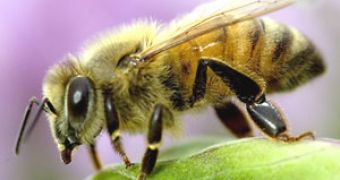An unusual phenomenon was spotted by French beekeepers in Alsace, France, as their bees' honey turned red, blue, green, yellow and brown. They blame a near-by M&M waste processing plant for what they believe is an unsellable batch.
Beekeepers in the town of Ribeauvillé, in the French Alsace region have investigated the provenience of the unnatural shades of honey. They followed the insects to understand what had changed in their feeding pattern, rawstory.com reports.
Observing the behavior of the bees, they noticed they had given up pollinating flowers from the local fields, as they had done until that point, turning over to the much sweeter M&M particles they found in waste containers at the neighboring M&M factory.
The facility, owned by the Mars group, produces sugar-based shells that cover the colored chocolaty capsules. The biogas plant also processes waste from the chocolate factory, which it deposits in large tanks in outdoor enclosures.
A dozen apiaries in the Ribeauvillé area have been affected by the M&M honey debacle. Beekeepers in the region are outraged, as honey is their main source of income. They tasted the substance, and it appears nothing has changed in its aroma. However, regulations prohibit them from selling the abnormally tinted product.
“For me, it’s not honey. [...] It’s not sellable,” André Frieh, head of the local beekeepers’ association said, faced with a dilemma of what to do with large stocks of unmarketable product.
In order to prevent further claims, and possibly facing legal action for their disregard for the bees' habitat, the Agrivalor company that administrates the Mars sites has starting setting up covered facilities in which to store waste containers. Reps state they have made efforts to dispose of previous residues and clean up the remaining outdoor tanks.
The Alsace produces an estimate of 1,000 tons of honey per year, a small amount if you take into consideration the fact that there are currently 2,400 beekeepers registered in the region.

 14 DAY TRIAL //
14 DAY TRIAL //